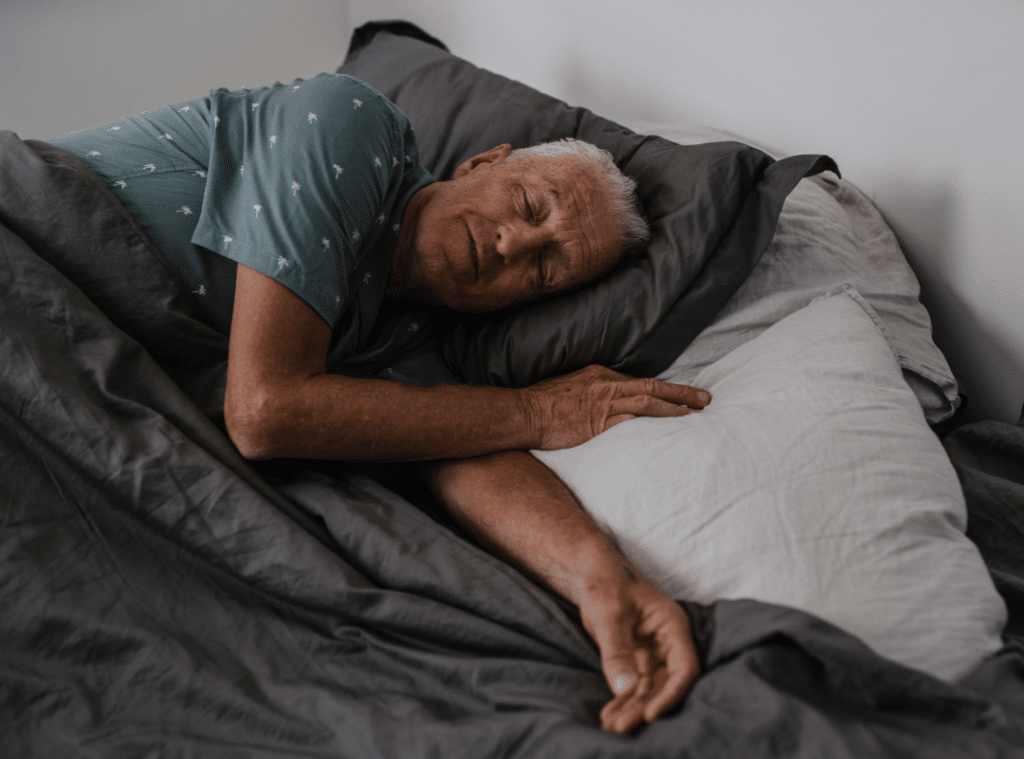Imagine sleep as a fragile thread that weakens over time. For many seniors, insomnia in elderly disrupts their nights, affecting their overall well-being. Addressing this issue requires understanding its causes and exploring practical solutions that promote healthier sleep patterns.
Understanding Insomnia in the Elderly
As people age, changes in sleep architecture make it harder to achieve deep, restorative sleep. The body’s internal clock shifts, leading to frequent awakenings and daytime drowsiness. Additionally, drugs that cause insomnia in the elderly can further complicate sleep patterns. Recognizing these disruptions is the first step toward finding a remedy for insomnia for elderly individuals.
Identifying underlying sleep disorders helps address the root causes, fostering a compassionate and proactive approach to sleep improvement.
Causes and Risk Factors of Geriatric Insomnia
Sleep disturbances in seniors often stem from medical conditions, psychological stressors, or lifestyle habits. Drugs that cause insomnia in the elderly include certain antidepressants, beta-blockers, and diuretics, which can lead to frequent nighttime awakenings. Age-related changes in circadian rhythms make falling and staying asleep more difficult.
Understanding how circadian rhythms shift allows for targeted strategies to realign sleep-wake cycles and enhance restfulness.
Types of Insomnia in Older Adults
There are different forms of insomnia in the elderly, each requiring specific interventions. Primary insomnia occurs without any identifiable cause, while secondary insomnia is linked to conditions such as anxiety, chronic pain, or medication side effects.
Proper evaluation and adherence to geriatric insomnia guidelines ensure seniors receive the proper support to improve their sleep quality. Addressing mental health concerns can also alleviate sleep disturbances, creating a more balanced sleep pattern.

Natural Remedies for Insomnia in Elderly
When looking for a remedy for insomnia for the elderly, non-pharmacological approaches can be highly effective. Natural remedies for insomnia in the elderly include cognitive behavioral therapy, sleep hygiene practices, and lifestyle modifications.
Optimizing Sleep Hygiene
A consistent bedtime routine and a conducive sleep environment significantly impact sleep quality. Establishing a relaxing pre-sleep ritual and reducing blue light exposure in the evening can make a substantial difference.
Circadian Rhythm Regulation
Aligning daily routines with natural light exposure helps reset the body’s internal clock. Spending time outdoors in the morning and maintaining a regular sleep schedule enhances consistency.
Developing a structured bedtime schedule is essential for better sleep outcomes in seniors.
Medical Management and Professional Support
Following geriatric insomnia guidelines, healthcare professionals often recommend behavioral interventions before prescribing medication. However, when necessary, low-dose sedatives or melatonin supplements may be used with caution to avoid dependency.
Exploring a remedy for insomnia for the elderly should always involve a holistic approach, prioritizing non-medication strategies for long-term benefits.
Enhancing Sleep Through Community Support
A supportive community plays an essential role in managing insomnia in the elderly. Social engagement reduces stress and loneliness, which contribute to sleep disturbances. Connecting with local sleep groups and participating in structured activities can provide emotional and practical support.
By implementing effective solutions and recognizing the impact of lifestyle and medical factors, seniors can enjoy better sleep and improved overall well-being. For further guidance, contact our expert team today or at 805-845-4921.
Dive into the vibrant life our Westmont communities have to offer.Find Where You Belong
Frequently Asked Questions
What medications are used for insomnia in the elderly?
Common medications for insomnia in older adults include low-dose trazodone, melatonin, and certain sedative-hypnotics like zolpidem (Ambien) or eszopiclone (Lunesta). However, due to the risk of side effects like dizziness, confusion, and falls, doctors often recommend non-medication approaches first. Seniors need to discuss options with their healthcare provider to find the safest and most effective treatment.
What causes insomnia in older adults?
Changes in sleep patterns, medical conditions, medication side effects, or lifestyle factors can cause insomnia in older adults. Common health issues like chronic pain, anxiety, depression, and restless leg syndrome can disrupt sleep. Additionally, reduced melatonin production and increased nighttime awakenings contribute to sleep difficulties as people age.
What can help an elderly person sleep?
Improving sleep hygiene, such as maintaining a consistent bedtime, avoiding caffeine and electronics before bed, and creating a comfortable sleep environment, can help. Relaxation techniques, light exercise during the day, and exposure to natural light can also promote better sleep. If sleep problems persist, consulting a doctor for evaluation and potential treatment options is recommended.
What is the best treatment for insomnia?
The best treatment for insomnia depends on the underlying cause but often includes lifestyle changes and cognitive behavioral therapy for insomnia (CBT-I). Medications may be used in some cases, but they are typically a last resort for older adults due to potential side effects. A personalized approach that addresses sleep habits, stress management, and medical conditions usually results in the best results.








